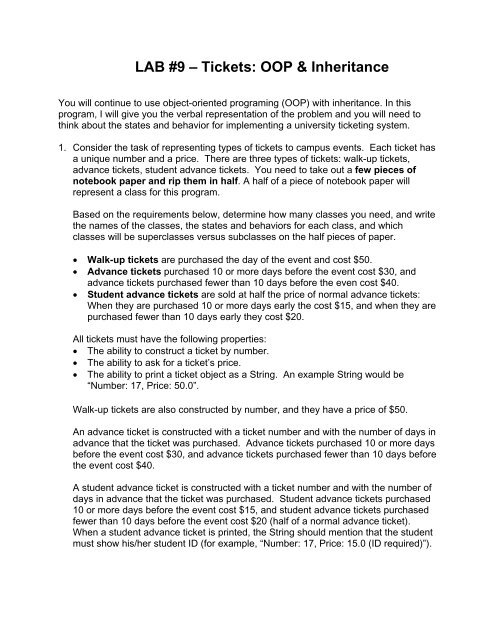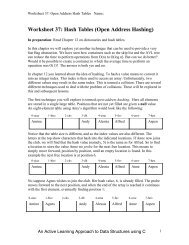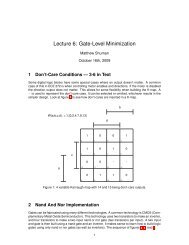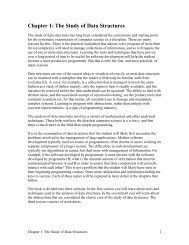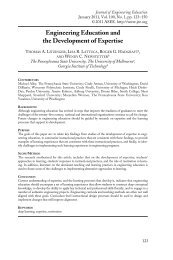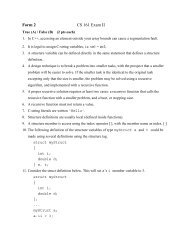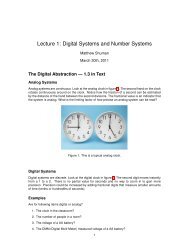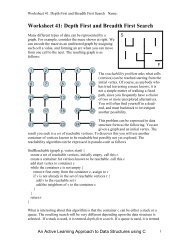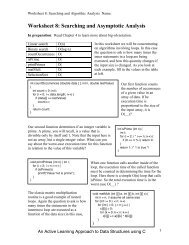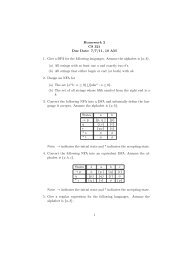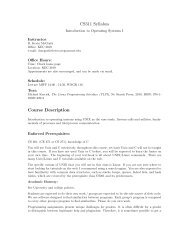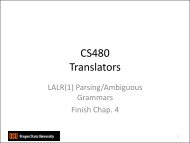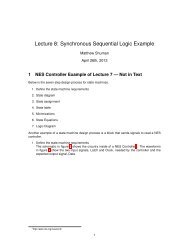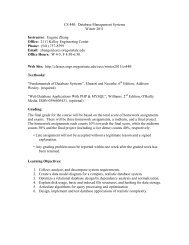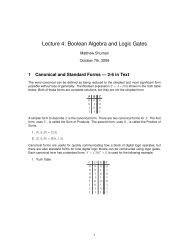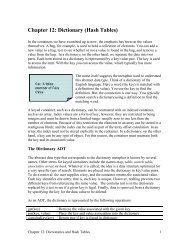LAB #9 â Tickets: OOP & Inheritance - Classes
LAB #9 â Tickets: OOP & Inheritance - Classes
LAB #9 â Tickets: OOP & Inheritance - Classes
Create successful ePaper yourself
Turn your PDF publications into a flip-book with our unique Google optimized e-Paper software.
<strong>LAB</strong> <strong>#9</strong> – <strong>Tickets</strong>: <strong>OOP</strong> & <strong>Inheritance</strong><br />
You will continue to use object-oriented programing (<strong>OOP</strong>) with inheritance. In this<br />
program, I will give you the verbal representation of the problem and you will need to<br />
think about the states and behavior for implementing a university ticketing system.<br />
1. Consider the task of representing types of tickets to campus events. Each ticket has<br />
a unique number and a price. There are three types of tickets: walk-up tickets,<br />
advance tickets, student advance tickets. You need to take out a few pieces of<br />
notebook paper and rip them in half. A half of a piece of notebook paper will<br />
represent a class for this program.<br />
Based on the requirements below, determine how many classes you need, and write<br />
the names of the classes, the states and behaviors for each class, and which<br />
classes will be superclasses versus subclasses on the half pieces of paper.<br />
Walk-up tickets are purchased the day of the event and cost $50.<br />
Advance tickets purchased 10 or more days before the event cost $30, and<br />
advance tickets purchased fewer than 10 days before the even cost $40.<br />
Student advance tickets are sold at half the price of normal advance tickets:<br />
When they are purchased 10 or more days early the cost $15, and when they are<br />
purchased fewer than 10 days early they cost $20.<br />
All tickets must have the following properties:<br />
The ability to construct a ticket by number.<br />
The ability to ask for a ticket’s price.<br />
The ability to print a ticket object as a String. An example String would be<br />
“Number: 17, Price: 50.0”.<br />
Walk-up tickets are also constructed by number, and they have a price of $50.<br />
An advance ticket is constructed with a ticket number and with the number of days in<br />
advance that the ticket was purchased. Advance tickets purchased 10 or more days<br />
before the event cost $30, and advance tickets purchased fewer than 10 days before<br />
the event cost $40.<br />
A student advance ticket is constructed with a ticket number and with the number of<br />
days in advance that the ticket was purchased. Student advance tickets purchased<br />
10 or more days before the event cost $15, and student advance tickets purchased<br />
fewer than 10 days before the event cost $20 (half of a normal advance ticket).<br />
When a student advance ticket is printed, the String should mention that the student<br />
must show his/her student ID (for example, “Number: 17, Price: 15.0 (ID required)”).
2. After a TA checks your class and inheritance information written on the pieces of<br />
paper, you may begin the rest of the lab. Implement your superclass and<br />
subclasses. Define all common operations in the superclass, and specify all<br />
differing operations in such a way that every subclass must implement them. No<br />
actual objects of the superclass will be created because each actual ticket will be an<br />
object of a subclass type. Make sure your classes provide encapsulation!!!<br />
3. Now, write a PurchaseTicket client that creates an array of the three types of<br />
tickets. When you are creating your advance and student advance tickets, you need<br />
to have a way to determine the price based on the event day and the purchase day.<br />
You can test this by using arbitrary integer numbers such as an event day of 31 and<br />
purchase day of 10. Of course you can make this much more rigorous, but we are<br />
only testing here, refer to the Extras for more.<br />
Test the functionality of your design by printing the individual price and ticket number<br />
attributes, as well as the object containing the String information. ***I’m being vague<br />
here because part of this lab is to make sure you understand how to go about testing<br />
effectiveness of your implementation without knowing exactly how the end product<br />
will behave.***<br />
Extras:<br />
Add the functionality for a more rigorous date system for the advance tickets, i.e.<br />
month and day for the event rather than an integer. Also, use today’s date as a<br />
means to determine how far in advance the ticket is being purchased. Hint: Use<br />
Java API to research the Date class.<br />
<br />
Start on your Assignment #6, and have a good Thanksgiving break!!!


